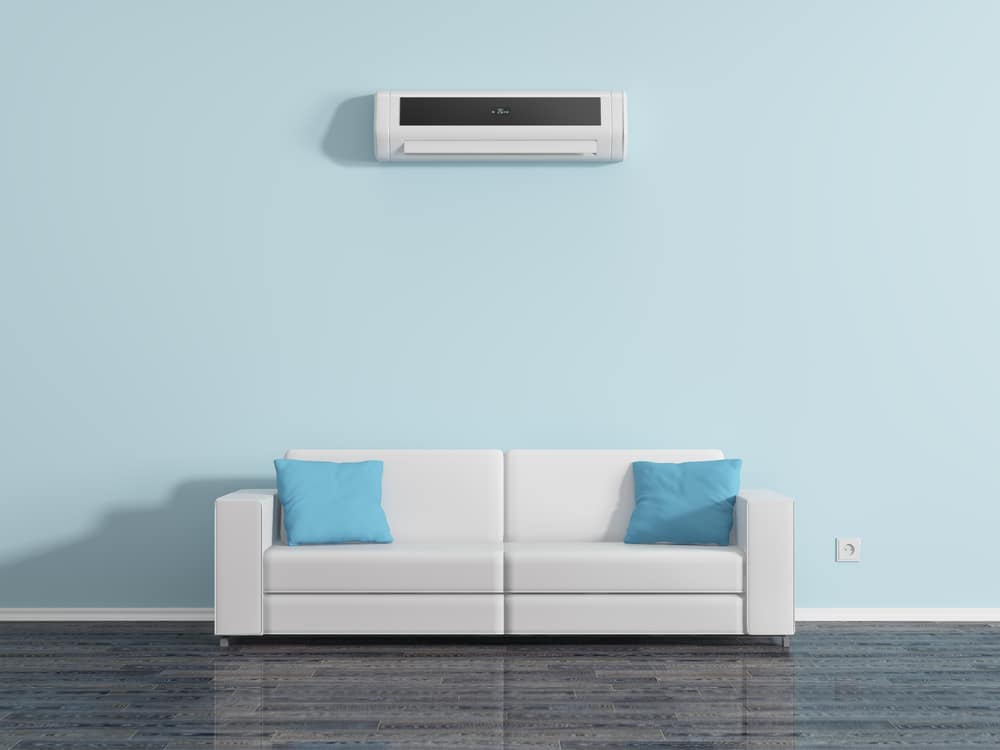During the summertime, an air conditioner is a must-have. We don’t bother with air conditioner repair or service as long as the system is running well. However, no one likes it when anything leaks since it wastes water and might harm items. So you might be asking, why is my AC leaking water?

Why is My AC Leaking Water?
There are various reasons for your AC leaking water, and we’ll go over a few of them here, along with how to fix them.
Dirty Air Filter
Cleaning the air filter is one of the many duties that homeowners frequently overlook. A clogged air filter can cause a variety of problems with your air conditioner, including AC leaking water. When filters become clogged, airflow is restricted, resulting in frozen coils. When the ice melts, the system will be overflowing with water, and the drain pan will be unable to hold it. Check the condition of the air conditioner filter to see if it needs to be cleaned.
Make sure your system is turned off before examining the filter.
Remove the filter by unscrewing the vent cover or using the release handle when it’s safe to do so. Slide the AC filter out gently, be careful not to damage it, and inspect it well. If the AC filter shows any signs of grayness, discoloration, or visible surface dust. It’s time to clean it—or replace it. Using a handheld vacuum cleaner or an attachment on the end of an upright vacuum’s hose, remove dust and debris from a reusable air conditioner filter.
You can hire Sarasota AC Services for professional cleaning and maintenance of your AC. Also, they offer filter change services, which can save you time and effort.
Run warm water through the filter in the opposite direction of airflow using your bathtub faucet or handheld shower head for an even deeper clean. Once you have thoroughly cleaned it, put it back.
Condensate Line Blocked
Condensation (water) runs into the emergency drip pan instead of out the drain line when a condensate line is blocked. If the problem is not addressed, the condensate lines will deteriorate and leak water into the attic or walls of your home, causing property damage. Never pour bleach or other household cleaners into your condensate line if you want to clean it. This has the potential to harm both your system and your home. Only clean condensate pipes to stop aircon from leaking water with cleaners designed exclusively for this purpose. If you want an all-natural solution, a mixture of vinegar and filtered water will assist to eliminate and prevent bacteria growth.
First, your air conditioner should be turned off. After that, look for the drain pipe. If you reside in a single-family home, the condenser unit will be situated outside. It will be in the same closet as the furnace if you reside in a building. It is a PVC pipe with a cap made of plastic. Remove the cover from the pipe and check for any debris lodged in the drain; if there is any visible material, remove it and retest for good drainage. Then vinegar should be poured in. Finally, replace the drain cover and wait half an hour before turning back on your air conditioner.
Frozen Evaporator Coil
If ice accumulates on the coil, your air conditioner will have serious problems. The most serious issue is that your air conditioner will lose its ability to cool and will begin to overheat. Furthermore, as the frost melts and drops down, the water might overflow the drain pan and spread throughout your property.
What causes ice to build on an evaporator coil? The most typical cause is a lack of airflow through your air conditioning system. A dust-clogged air filter is usually the blame. When the air filter in your system becomes clogged with dust, it becomes difficult for it to pull air through. As a result, there is little warm air traveling over your chilly evaporator coil, which might cause frost to form.
Improper Installation
If your air conditioning system was recently installed and is leaking, the most likely culprit is a faulty air conditioning setup. This means the air conditioning and drainage lines are out of balance. Consequently, the water flow from the drainage pan is disrupted. If the water cannot flow forward, it may flow backward or remain at the same level. Ensure that the pipe is at a lower height than the main unit during the air conditioner installation so that the water may flow downwards towards the drainage exit.
Air conditioner leaks are virtually always preventable during an annual air conditioner maintenance visit. Your HVAC expert will have the opportunity to inspect the components of your interior and outdoor AC systems for any potential faults that might result in leaks, efficiency concerns, or malfunctions while tuning them up.
How to Stop AC Leaking Water
Routine maintenance also ensures that your air conditioner operates at top efficiency, keeping your house comfortable and your energy bills low.

